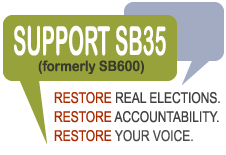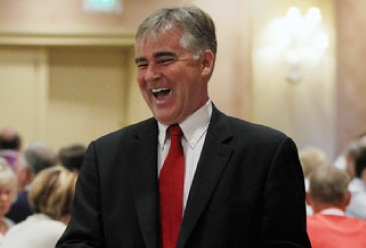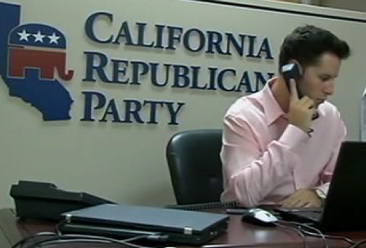By THE WATCHDOG • May 17, 2010
 The Pantagraph’s gushing editorial on Sunday was just the latest demonstration of the non-stop love affair many Illinois newspapers have had with Jim Edgar since he left office in January of 1999.
The Pantagraph’s gushing editorial on Sunday was just the latest demonstration of the non-stop love affair many Illinois newspapers have had with Jim Edgar since he left office in January of 1999.
The Pantagraph journeyed to the mountain top and brought back these sage words from the former governor, “It will probably take a combination of spending cuts and a tax increase to get the state out of the jam it’s in. But the cuts have to come first.”
Wow, that’s original. Thank goodness for all of us that Mr. Edgar was able to take time away from helping Youbet.com solidify its gambling ties in Illinois to weigh in with that insight.
The Pantagraph concluded its love note with, “We want more lawmakers – and candidates for governor – demonstrating the political courage, leadership and common sense of Jim Edgar.”
Maybe a better ending would have been, “Jim, do you like us? YES/NO (circle one)”
It’s true Illinois had a budget surplus when Edgar left office. Of course a lot of states had surpluses by the late 1990’s. Revenues flooded in thanks to a red hot national economy that with 20/20 hindsight we can say owed a lot to the dotcom bubble.
But how is Edgar’s tenure rated by those without a schoolgirl crush on the man? What do seasoned professionals in the field of economics say?
Well, in September 1998, the highly respected conservative think tank, the Cato Institute, issued its biennial report called A Fiscal Policy Report Card on America’s Governors.
Looking at the governors of the five most populous states, Jim Edgar and George Voinovich (then governor of Ohio) tied with the lowest grade assigned, a ‘D.’
Here’s more of what the Cato Institute had to say about the Jim Edgar years, from page 40 of its 1998 report:
In his eight years in the statehouse, Edgar has earned a reputation as one of the nation’s most pro-tax governors. He has proposed income tax hikes on four separate occasions and a spate of other levies on cigarettes, telephones, and riverboat gambling.
In 1997 the Wall Street Journal dubbed Edgar a “tax recidivist” for his seemingly annual endorsement of higher taxes. “At a time when most states are cutting taxes,” noted the Journal, “the Illinois governor has turned himself into a lagging indicator, proposing a 25 per-cent income tax hike.”
Even more damning was the praise recently bestowed on Edgar by Bob Chase, president of the pro-tax National Education Association, who gushed, “We need more brave politicians like Illinois’ Gov. Edgar.”
Edgar’s most recent $1.5 billion income tax increase proposal was defeated by the members of his own party, when 51 of 58 Republicans in the state assembly voted no. That rejection was not unusual. For most of the past eight years the moderate to liberal Edgar has been at war with the conservative wing of the GOP. He has threatened numerous vetoes of assembly tax cuts. He has opposed a top priority of Illinois taxpayer groups, a 2/3 supermajority vote to raise taxes. This past year Edgar finally agreed to a small tax cut of $125 million out of a projected $1 billion surplus. Meanwhile, in three years Edgar has inflated the state budget by $3 billion, to $37.4 billion. His latest budget spends lavishly on schools, prison construction, kidcare, and Medicaid expansions.
Edgar’s chief accomplishment has been passage of a “tough love” welfare reform bill that encourages mothers to work and caps Temporary Assistance to Needy Families benefits. Welfare caseloads have fallen impressively on Edgar’s watch.
Edgar is leaving office in January 1999 and trumpets “fiscal integrity” as one of his most important legacies. Tax and spend might be a better label for the Edgar years. [Emphasis added.]
So there you have it. The Cato Institute doesn’t get star-struck like newspaper editorial boards seem to in this state. Cato stays grounded in reality.
Whether it’s a down economy or a booming economy – Edgar’s for raising taxes. He’s always been that way, as Cato’s analysis above highlights. It’s like the guy’s obsessed.
Maybe it’s an obsession that comes from being on the government payroll pretty much one’s entire adult life.
END










